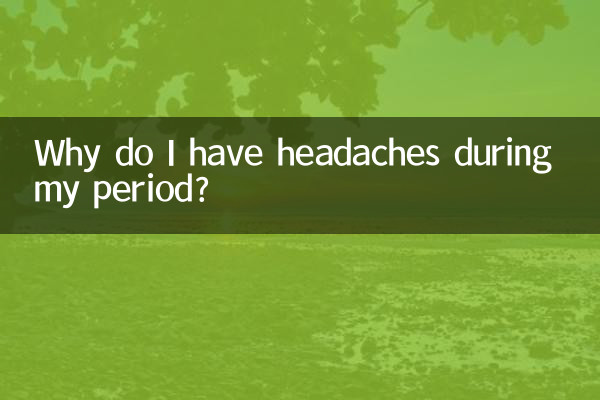Why do I have headaches during my period?
Many women experience headaches during or around menstruation, a condition known as "menstrual headache" or "hormonal headache." This phenomenon is closely related to changes in hormone levels in the body. Here's a detailed breakdown of period headaches, including causes, symptoms, ways to relieve them, and relevant data.
1. Main causes of menstrual headaches

The main cause of menstrual headaches is fluctuations in estrogen and progesterone levels. Here are the specific reasons:
| reason | illustrate |
|---|---|
| drop in estrogen levels | A sharp drop in estrogen levels before menstruation may trigger migraines. |
| prostaglandin release | During menstruation, the endometrium releases prostaglandins, which may cause vasoconstriction and headaches. |
| Decreased iron content | Blood loss during menstruation can cause iron levels to drop, causing fatigue and headaches. |
| stress and mood swings | Hormonal changes during menstruation may exacerbate stress and anxiety, which can trigger headaches. |
2. Common symptoms of menstrual headaches
The symptoms of period headaches may vary from person to person, but here are some common symptoms:
| symptom | describe |
|---|---|
| Unilateral or bilateral headache | The pain may be concentrated on one or both sides of the head. |
| throbbing pain | The headache may be accompanied by a throbbing sensation, similar to a migraine. |
| nausea or vomiting | Some women experience digestive system discomfort. |
| Sensitive to light or sound | You may be more sensitive to light or noise during a headache. |
3. How to relieve menstrual headaches?
Here are some effective mitigation methods:
| method | illustrate |
|---|---|
| stay hydrated | Dehydration may worsen headaches, so it is recommended to drink enough water every day. |
| Regular schedule | Get enough sleep and avoid staying up late. |
| moderate exercise | Mild exercise such as yoga or walking can help relieve symptoms. |
| Hot or cold compress | Use hot or cold compresses to relieve headaches, depending on personal preference. |
| diet modification | Reduce your intake of caffeine, alcohol and high-salt foods. |
| drug treatment | Over-the-counter pain relievers such as ibuprofen or acetaminophen may be effective. |
4. Preventive measures for menstrual headaches
If period headaches occur frequently, you can try the following preventive measures:
| measure | illustrate |
|---|---|
| Record headache cycle | Take preventive measures in advance by keeping track of your menstrual cycle and headache times. |
| Supplement magnesium | Research shows that magnesium supplements may reduce the frequency of menstrual headaches. |
| hormone therapy | Under the guidance of a doctor, use birth control pills or other hormone therapies to regulate hormone levels. |
| Stress Reduction Techniques | Meditation, deep breathing, or massage can help relieve stress. |
5. When do you need medical treatment?
Most menstrual headaches can be relieved with home care, but prompt medical attention is recommended in the following situations:
| Condition | illustrate |
|---|---|
| Headache that is severe and persistent | The pain cannot be relieved by conventional methods. |
| accompanied by other symptoms | Such as blurred vision, difficulty speaking, or numbness of the limbs. |
| increased frequency of headaches | The number of monthly headaches increased significantly. |
| Medication is ineffective | Over-the-counter medications do not relieve symptoms. |
6. Summary
Period headaches are a common problem faced by many women and are primarily related to hormone fluctuations, prostaglandin release, and reduced iron levels. Symptoms can be effectively relieved by adjusting lifestyle, diet and appropriate use of medications. If headaches are frequent or accompanied by other abnormal symptoms, you should seek medical treatment promptly.
I hope this article can help you better understand the causes of menstrual headaches and how to deal with them, so as to reduce the discomfort during menstruation.

check the details

check the details